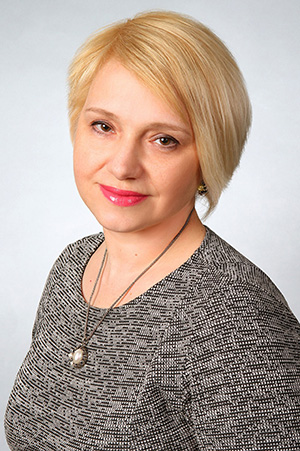|
 UDC 331.108.2; JEL E22, E24, F66, J24
UDC 331.108.2; JEL E22, E24, F66, J24
Kuznetsova, N. (2022). Konkurentospromozhnist' talantiv Ukrayiny u svitovykh reytynhakh [Competitiveness of Ukrainian talents in world ratings]. In Sotsial'no-ekonomichni problemy suchasnoho periodu Ukrayiny [Socio-Economic Problems of the Modern Period of Ukraine]: Vol. 153 (1) (pp. 45-53). DOI: https://doi.org/10.36818/2071-4653-2022-1-7. [in Ukrainian].
Sources: 20
Authors
Kuznetsova Nataliya BohdanivnaPh.D. of Economics, Associate Professor
Doctoral Postgraduate of the Department of international management of the Kyiv National Economic University n.a. Vadym Hetman
Contacts:  nataliya.kuznetsova14@gmail.com nataliya.kuznetsova14@gmail.com
Webpages: 
ResumeTalents become a key determinant of sustainable economic development under the condition of a balanced and effective governmental policy aimed at their cultivating, developing, and retaining. Countries that accumulate a critical mass of such talent will be able to quickly overcome existing crises, actively innovate, and ensure progressive economic and social development. The article identifies the role and importance of talents to ensure the competitiveness of the national economy and its growth. The competitiveness of talents from different countries, including Ukraine, was assessed according to two influential rankings – IMD World Talent Ranking and The Global Talent Competitiveness Index (GTCI). The study of both rankings helps to identify the TOP-10 countries in the world with the best indicators of talent development, as well as Ukraine’s positioning among the countries of the world and Eastern Europe. Ukraine’s talent assessment according to IMD World Talent Ranking shows that with relatively high investment in talent development, Ukraine remains unattractive to foreign and domestic talent with a relatively low quality of skills and competencies of the existing workforce, which indicates low efficiency of measures taken by the government and state financial management on talent development. According to GTCI, Ukraine has the best position in the lower-middle-income countries in terms of both the overall competitiveness index and its criteria but occupies the lowest position in Eastern Europe. The country is characterized by lasting low positions in the Input pillars of the GTCI, including its two components – Enablers and the policy of attracting talent to the country (Attract), indicating low activity of government and business in creating a favorable environment for talent development. Based on the results of the study, the author identifies the factors that affect the competitiveness of talent in Ukraine and offers basic measures to overcome the skills shortage and create a favorable environment for the development and attraction of talent in Ukraine.
Keywords:talents, human capital, talent competitiveness, world rankings, Ukraine, the COVID-19 pandemic
References- Florida, R. (2006). The Flight of the Creative Class: The New Global Competition for Talent. New York: Harper Business.
- Leikuma-Rimicane, L., Komarova, V., Lonska, J., Selivanova-Fyodorova, N., & Ostrovska, I. (2021). The role of talent in the economic development of countries in the modern world. Entrepreneurship and Sustainability Issues, 9(2), 488-507. DOI: http://doi.org/10.9770/jesi.2021.9.2(32)
- Cubas, G., Ravikumar, B., & Ventura, G. (2016). Talent, labor quality, and economic development. Review of Economic Dynamics, 21, 160-181. DOI: https://doi.org/10.1016/j.red.2015.06.004
- Vynnychuk, R. O. (2018). Talanty yak osoblyva katehoriya pratsivnykiv orhanizatsiyi [Talents as the special category of personnel]. Hlobal’ni ta natsional’ni problemy ekonomiky – Global and National Problems of Economy, 21, 246-250. [in Ukrainian].
- Talent (2022). Dictionary.com: Website. Retrieved from https://www.dictionary.com/browse/talent
- Talent (2022). Oxford Learner’s Dictionaries: Website. Retrieved from https://www.oxfordlearnersdictionaries.com/definition/american_english/talent
- Talent (2022). Merriam-Webster: Website. Retrieved from https://www.merriam-webster.com/dictionary/talent
- Talent (2022). Lexico: Website. Retrieved from https://www.lexico.com/definition/talent
- Creative Industries Mapping Document (1998). Gov.uk: Website. Retrieved from https://www.gov.uk/government/publications/creative-industries-mapping-documents-1998
- Country Overview Ukraine (2021). IMD World Competitiveness Online: Website. Retrieved from http://worldcompetitiveness.imd.org
- IMD World Talent Ranking 2014-2021 (2021). Dokumen: Website. Retrieved from https://dokumen.tips/documents/wiseco-imd-world-talent-ranking
- World Talent Ranking 2021 (2021). IMD: Website. Retrieved from https://www.imd.org/centers/world-competitiveness-center/rankings/world-talent-competitiveness
- Lanvin, B., & Monteiro, F. (Eds.) (2021). The Global Talent Competitiveness Index 2021. Talent Competitiveness in Times of COVID. Fontainebleau. Retrieved from https://www.insead.edu/faculty-research/research/gtci
- Lanvin, B., & Monteiro, F. (Eds.) (2014). The Global Talent Competitiveness Index 2014. Growing talent for today and tomorrow. Singapore. Retrieved from https://www.insead.edu/sites/default/files/assets/dept/globalindices/docs/GTCI-2014-report.pdf
- Lanvin, B., & Monteiro, F. (Eds.) (2015). The Global Talent Competitiveness Index 2015-2016. Talent Attraction and International Mobility. Fontainebleau. Retrieved from https://www.insead.edu/sites/default/files/assets/dept/globalindices/docs/GTCI-2015-2016-report.pdf
- Lanvin, B., & Monteiro, F. (Eds.) (2016). The Global Talent Competitiveness Index 2017. Talent and Technology. Fontainebleau, Retrieved from https://www.insead.edu/sites/default/files/assets/dept/globalindices/docs/GTCI-2017-report.pdf
- Lanvin, B., & Monteiro, F. (Eds.) (2018). The Global Talent Competitiveness Index 2018. Diversity for Competitiveness. Fontainebleau, Retrieved from https://www.insead.edu/sites/default/files/assets/dept/globalindices/docs/GTCI-2018-report.pdf
- Lanvin, B., & Monteiro, F. (Eds.) (2019). The Global Talent Competitiveness Index 2019. Entrepreneurial Talent and Global Competitiveness. Fontainebleau. Retrieved from https://www.insead.edu/sites/default/files/assets/dept/globalindices/docs/GTCI-2019-Report.pdf
- Lanvin, B., & Monteiro, F. (Eds.) (2020). The Global Talent Competitiveness Index 2020. Global Talent in the Age of Artificial Intelligence. Fontainebleau. Retrieved from https://www.insead.edu/sites/default/files/assets/dept/globalindices/docs/GTCI-2020-report.pdf
- Kuznetsova, N. (2021). Skills and qualifications mismatch phenomenon: focus on human capital in the global measurement. In Theoretical and methodological approaches to the formation of a modern system of national and international enterprises, organizations and institutions’ development. 2nd ed. Dallas: Primedia eLaunch LLC, 2020-2021. DOI: https://doi.org/10.36074/tmafmseoid.ed-2.13
|